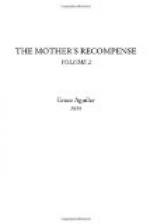Edward contrasted his present feelings with those which he had experienced the first night of his last return, and Ellen thought on that bitter anguish, the public shame which had been hers in that very hall, that very night three years before, and the young hearts of both the orphans were filled with warm and deep thanksgiving. The thoughts of all were composed and tranquillized when Mr. Howard ceased, and in the little time that intervened between the conclusion of the service and the family separating to their rooms, no light and frivolous converse disturbed the solemn but sad impression on the minds of each.
“I cannot part from you for the night, my dear cousin,” said Edward, somewhat archly, though in a low voice, as he approached the spot where Caroline and St. Eval stood, “without offering you my warmest congratulations on your future prospects, and without requesting an introduction from you to him, in whom I am to welcome a new relative. I have been wishing to do so all the evening, but when I was at liberty I missed you.”
Evidently pleased, Caroline looked up into St. Eval’s face, but before she could speak, the young earl had warmly pressed Edward’s hand, and answered with sincerity and kindness equal to his own. The whole party very soon afterwards dispersed.
Were it ours to follow our young and still, in appearance, childlike friend Emmeline Hamilton to her room that night, we should see that the smiles which had beamed around her lip had passed away, the flush on her cheek was no longer there, and one or two bright drops might have been observed slowly falling on her pale cheek, as she sat in deep musing, ere she retired to her couch. She had dismissed Fanny, alleging that she did not require her aid, and her long silky hair loosened from its confinement, hung carelessly in golden waves around her. Tears fell on her hand; she started, and flung back her tresses, looked fearfully around her, and passed her hand across her eyes, as if to check them—but ineffectually; another, and another fell; she leaned her crossed arms upon the pillow, and her head drooped on them, and she wept, wept as she had never wept before, and yet she knew not wherefore; she was sad, how deeply sad, but that young and guileless spirit knew not why. Child she was still in looks, in playfulness, in glee; a child she still believed herself, but she was no child—that age of buoyancy had fled, and Emmeline was, indeed, a woman, a thinking, feeling, ay, and loving woman.




